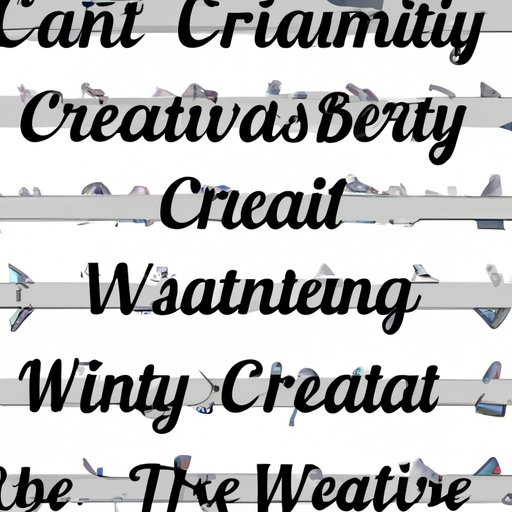Introduction
Creative writing is a form of art that can help people solve their problems, express themselves, and understand the world around them in a different way. By exploring this art form, one can gain a better understanding of how to use it to create compelling stories and works of art. In this article, we will explore what creative writing is, the different types of creative writing, tips for writing creatively, the benefits and challenges of creative writing, and interviews with creative writers and their writing processes.

Defining Creative Writing: A Guide to Understanding the Art
Creative writing is defined as “the art of expressing oneself imaginatively and effectively through the written word” (Oxford English Dictionary). It is a type of writing that allows the author to express their own thoughts, feelings, and experiences in an imaginative way. Creative writing can take many shapes and forms, such as fiction, poetry, plays, screenplays, and more.
It is important to differentiate between traditional and creative writing. Traditional writing is typically characterized by its logical structure, factual accuracy, and formal language. Creative writing, on the other hand, is characterized by its imaginative nature, artistic expression, and emotional impact. The purpose of creative writing is to evoke emotions in the reader and tell stories that engage and captivate the audience.

Exploring the Different Types of Creative Writing
There are many different types of creative writing, each with its own unique style and purpose. Here are some of the most popular types:
Narrative Writing
Narrative writing is a type of story-telling that engages the reader and allows them to explore a particular theme or concept. It typically involves characters, settings, and a plot, and can take the form of novels, short stories, or even autobiographies.
Poetry
Poetry is a type of creative writing that uses imagery and rhythm to convey emotion and meaning. It can take many forms, such as free verse, haiku, sonnets, and more. Poetry is often used to express feelings and ideas that cannot be expressed in prose.
Scriptwriting
Scriptwriting is a type of creative writing used to create scripts for films, television shows, plays, and more. Scriptwriters must be able to create compelling stories and dialogue that will engage the audience and draw them into the story.
Non-Fiction
Non-fiction is a type of creative writing that uses facts, data, and research to tell a story. Non-fiction can take the form of biographies, memoirs, articles, essays, and more. Non-fiction writers must be able to craft a compelling story from factual information.
Journalism
Journalism is a type of creative writing that focuses on reporting news and events. Journalists must be able to write engaging and accurate stories that inform the public about current events.
Tips for Writing Creatively
Writing creatively can be a daunting task, but there are several tips that can help make it easier. Here are a few tips for writing creatively:
Brainstorming
When starting a new project, it is important to take time to brainstorm ideas. Brainstorming can help generate ideas and provide the writer with a direction for their work.
Creating a Writing Routine
Creating a writing routine can help keep the writer on track and motivated. Setting aside specific times each day to write can help ensure that progress is made on the project.
Finding Inspiration
Inspiration is essential for creative writing. Taking time to explore the world around you and find new sources of inspiration can help keep the creative juices flowing.
Editing Your Work
Editing is an important part of the creative writing process. Taking time to review and revise your work can help ensure that the final product is of the highest quality.
Benefits and Challenges of Creative Writing
Creative writing can be both rewarding and challenging. Here are some of the benefits and challenges of creative writing:
Benefits of Creative Writing
Creative writing offers many benefits for both the writer and the audience. According to a study conducted by the University of Michigan, creative writing can help reduce stress, improve mental health, and foster self-expression. Additionally, creative writing can be a form of therapy, allowing the writer to explore their thoughts and feelings in a safe and constructive environment.
Challenges of Creative Writing
Creative writing can also present many challenges. Finding the motivation to write can be difficult, as can dealing with writer’s block and imposter syndrome. Additionally, finding the right balance between accuracy and creativity can be a challenge for some writers.

Interviewing Creative Writers and Their Writing Processes
Interviewing creative writers can be a great way to gain insight into their writing processes and gain tips for improving your own. Here are some questions to ask when interviewing creative writers:
- What inspired you to become a creative writer?
- How do you come up with ideas for your writing?
- How do you stay motivated when writing?
- What advice would you give to aspiring creative writers?
By asking these questions, you can gain valuable insight into the creative writing process and learn from the experiences of other writers.
Conclusion
In conclusion, creative writing is a form of art that can help people solve their problems, express themselves, and understand the world around them in a different way. We explored the definition, purpose, types, tips for writing creatively, benefits, and challenges of creative writing, and interviewed creative writers and their writing processes. Creative writing can be both rewarding and challenging, but it can also be a great way to explore your thoughts, feelings, and experiences.
(Note: Is this article not meeting your expectations? Do you have knowledge or insights to share? Unlock new opportunities and expand your reach by joining our authors team. Click Registration to join us and share your expertise with our readers.)
